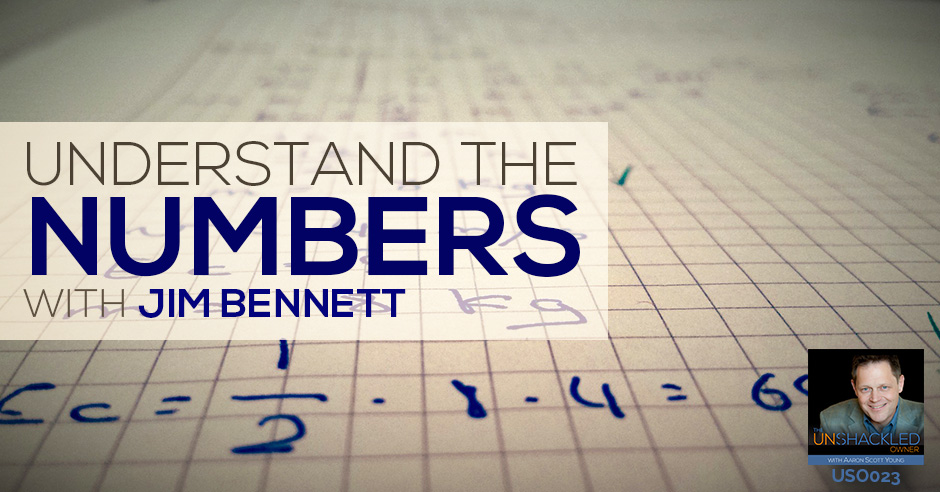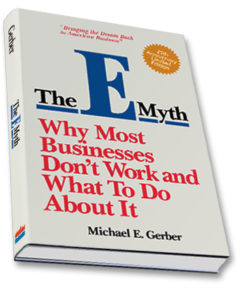 We’ve brought some great guests on for you over this last number of weeks. Today’s guest is going to be just another cherry on top of the sundae. Today, we’re going to be talking with Jim Bennett. He’s the founder and CEO of a wonderful company called NOW CFO. Jim is a CPA by training. He saw an entrepreneurial opportunity to really be able to bring great high-level bookkeeping and accounting and CFO work to lots of businesses who don’t really have maybe the budget to have a full-time CFO or controller. Maybe you’ve got an accounts payable clerk or accounts receivable clerk right now, but this is a way to really bring top-notch talent into a budget that growing businesses can afford.
We’ve brought some great guests on for you over this last number of weeks. Today’s guest is going to be just another cherry on top of the sundae. Today, we’re going to be talking with Jim Bennett. He’s the founder and CEO of a wonderful company called NOW CFO. Jim is a CPA by training. He saw an entrepreneurial opportunity to really be able to bring great high-level bookkeeping and accounting and CFO work to lots of businesses who don’t really have maybe the budget to have a full-time CFO or controller. Maybe you’ve got an accounts payable clerk or accounts receivable clerk right now, but this is a way to really bring top-notch talent into a budget that growing businesses can afford.
I’m really happy to have him. He’s a great guy. He’ll be speaking at our event. He’s going to be at the Magnify Your Wealth event, which is just coming up in a week, May 18th, 19th, and 20th, 2017 down at The Dana Resort on Mission Bay in San Diego, California. It’s not too late. We always oversell a little bit because things come up and people can’t get there sometimes. There are always a few tickets if anybody wants to come and be there and meet Jim and meet me and meet all kinds of fabulous presenters, and also an unbelievable room full of people. You can still come to the Magnify Your Wealth Summit, May 18, 19, and 20, in San Diego, California. If you want to learn about that, just write to me, Aaron@aaronscottyoung.com, and I’ll hook you up with the information.
Listen To The Episode Here
Understand The Numbers with Jim Bennett
Welcome to the program, Jim. How are you?
I’m doing fantastic, Aaron. Thank you for having me here. I’m honored and excited to be on your show here. Accounting is a little dry, but we’re going to try to make it interesting.
The numbers are the magic. The numbers are what help us navigate through all the ups and downs and changes and dot-com bubbles bursting and real estate collapses and near collapse of the economy in 2008. When you have good numbers, you can manage that stuff. But most people don’t have great numbers. Jim, first of all, do you have any more about your background or anything you want to share with us above and beyond what I said? Maybe give us a little idea of how you’ve got started and what brought you up to starting NOW CFO.
NOW CFO is twelve years old, started in 2005. I currently have 180 employees and in eighteen cities, which covers most of the Western US. It’s been pretty exciting. I worked at a very large accounting firm coming out of college. That was a great experience, but you feel shackled.
That’s because you’re a cog in the wheel. You’re part of a bigger program, you’re trying to work your way up and become a partner. It’s not entrepreneurial at all. It’s very corporate.

The Numbers: I’ve just really had come to the realization, I need to move on.
It’s very corporate and there are 15,000 employees and you’re a tiny cog. I had an opportunity to leave there and I spent the next six years out as a CFO or controller of five different companies. Each of those companies ended up being sold. That was an interesting experience for a guy whose career goal was to be the CFO of a nice company and felt I could make a difference. As those experiences happened, it brought me to a crossroad. One night, I went home and I was talking to my wife and said, “I really just think I’m going to go look for some clients and not look for another job.” She, being very supportive, says, “How in the world is that going to work? You don’t know how to get clients. You’re an accountant.” With that resounding support, I jumped off. I spent about six months planning an exit. Then I had another discussion with her. She said, “You’re an idiot. Don’t quit this job. Our youngest child is one-year-old and we have five children.” I just want to quit. I’ve just really had come to the realization, I need to move on. I’ve been doing accounting for other people for fifteen years.
Jim is describing his experience with his wife, his life partner, the mother of his children. They’re in this sucker together and she’s saying, “Honey, I’ve got these kids. I’m looking for safety and security. You’re in a good job, in a good firm.” Most people in the world do not see through the lens of an entrepreneur. Entrepreneurs see opportunities where other people are mostly just saying, “We need security.” Jim is describing in his own personal story what I’ve seen over and over again, which is if you really have that entrepreneurial vision, you see what is possible, you almost have to not listen to the voices of the people who love you the most, who want to protect you the most, who want you to be safe, because they just don’t see it. Who can blame her? You’ve got a little child, five kids, a one-year-old, and of course she wants security, but you saw an interesting opportunity. What happened? You made your exit, then what happened?
I made my exit and I’ve done some planning, I needed income. I had five clients lined up and I thought that would be okay. When I quit my job, it was an interesting meeting because my employer, the owner of that company, said, “I don’t have time to talk to you now about this. I’ve got to go out of town,” and left me sitting in his office. He didn’t accept my resignation. I continued to work there. He didn’t come back for several weeks. In the meantime, I started these other clients. Quickly, four of the five clients just disappeared.
All of a sudden, they don’t have the money to afford you or they just said, “We want it but we can’t actually do it.”
They backed out. I had agreements signed and everything. One of the clients took off nicely and we started to work. After two weeks, he said, “Just work as much as you want.” We sell work by the hour, and he had committed to eight hours a week. By the end of two weeks, he said, “Just come and work as much as you need. I just have so many things to do,” which was exciting. At about that time, my employer came back and this was a huge break considering four of the five clients have disappeared, our opportunities. He said, “Let’s make a deal. You take care of the accounting and financing of my company. This is the deal I want to offer you.” The combination of those two things got me started, so here I am.
You started and it was just you, solopreneur, with a couple of clients so you had money to live on. When you started realizing you could attract more business than you could personally serve, did you get to a place where you had to make a decision, “Should I bring somebody on?” There was that first person, right?
Yeah. In these other businesses that I had worked in as a CFO, I had watched mistakes being made around sales. I’m an accountant, so I’m shifting from loving my spreadsheets and I got to get out there and find work. I was very concerned and very stressed about selling from day one. Really quite quickly, over the next couple of months, I was able to find a couple of more opportunities and I brought on a part-time contractor to help do those.
Was that an accounting person or sales person?
It was just an accounting person. These were bookkeeping-type of engagements. I was just a guy driving around in my old Honda, hoping things would work out. I had established competitors. I couldn’t even get to the table on a lot of things I want to find out about. Just continued to look for opportunities in places that we could work. She worked for me for about three months, on a part-time basis. She said, “Financially, I’ve got to be full-time.” I was against that. I was scared to death to have her go full-time.
I’m so glad you just said that, because in my mind I was thinking, one of the big fears that I see people have is that you’re making enough money to live on and support your wife and five kids. “If I bring this full-time person on, that’s going to ding my income.” Is that one of the fears? “How am I going to keep this other person supported without giving up something I need?”

The Numbers: We lost 40% of our revenue on a Tuesday night.
It was definitely a fear. I was making enough to live on, just like you said. I was able to start to save just a little money. I had convinced my wife to continue to live on what we had been living on in the past. I said, “My commitment to you is I’m going to find a way, hell or high water, to make at least that much.” I was fortunate. She came on full-time and it was working okay. I had landed a couple more clients, so she was busy. The big hit later that year was we got quite a large client that she was working on. It just got busier and busier. It really was consuming her whole schedule. I was excited about it because they were paying us a lot more than we’d ever been paid.
I was driving home one night, it was about 8:30 in the evening, and the CFO of this bigger company that we were doing work at called and said she can’t come out tomorrow morning, she can’t come back. The guy’s name was Brian. I said, “Brian, what are you talking about?” He said, “Your name came up on our vendor list and we paid too much money. The CEO didn’t even know who you were. He told me to shut down any outsourcing.” We lost 40% of our revenue on a Tuesday night.
I thought you’re going to say they hired her away from you because she was doing so much of it. When the owner found out that it was an outsource resource, not a full-time employee, they cut it?
Yeah. The CFO got in trouble. He was a person that I had known for some time, that’s how we ended up working there. The reason I tell you that is not to scare you off, but those are the kind of things that derail a lot of entrepreneurs. It’s like the sky came crashing down and this is too much. If I was sitting in a room of entrepreneurs, I would say, “Don’t give up. Go back.” Even though it felt like the sky was not going to fall, it had fallen on us, it scared us to death and she’s in a panic, “How are you going to pay me?” I told you I had been saving a little money, so I said to her, “We’ll be okay, you’re not out on the street.” Not only was I encouraging her, I’m trying to convince myself of this.
We just really had to come back to what I would tell every entrepreneur to worry about every day and work on, maybe it’s a better thing to say than worry; just work on selling. We talked about different books to read, read The E Myth because at some point you’ve got to trust other people. You just trust and verify. You get people to help you and then check on what they’re doing. They’ll do a great job. We found some more clients. By the following summer, I had hired four more people and the business really took off.
What was the experience? As you started to grow, you started to have people that were remote, away from you and you weren’t seeing them, in other cities and states? How did you come to the conclusion to scale and how have you managed that on-going expansion to places where the people aren’t under your watchful eye?
I was in Salt Lake City when I started the first office. The second office was in Dallas. I moved a person that had worked for me that I trusted. I understood their work ethic and their passion about it. That was a little safer bet. It was still pretty scary. Everything has to become a system. You just need to work on processes so that you can trust that people will do work. There are check points on the road that we’re all headed down where you can stop in and look and make sure everything’s okay and you can do that quickly. Over the years, we’ve built processes around everything, from sales to the integrity of the work, to just everything we do, whether it’s recruiting or training or marketing. I keep saying this, trust the people will do their job and verify that they’re doing it, so that they know Big Brother is watching.
In The Unshackled Owner class, in the intensive that I teach, which was really why all these stuff came up, because people ask me, “How do you build companies that you don’t have to be there all the time?” I spent three days at Laughlin in 2016, I haven’t been there yet in 2017. “How do you do it?” I said, “If you put systems together and if you have great reporting and you have an empowered management team, then you can build a business and scale it away from you where you’re not the most critical employee in the business. Somebody still has to be looking at the reports. Somebody’s got to be doing the verify. That remains your position, I would assume.

The Numbers: To be unshackled and expand and scale, you need to be able to know that things are happening.
Each of us is wired differently, so you’ll have varying degrees of what that means to us. To be unshackled and especially just expand and scale, you just need to be able to know that things are happening. The only way you’re going to know is to get the data and the information. Of course, we all people pull together KPIs and dashboards and cashflow forecast and historical accounting. I’m a big believer in the numbers, but not just from doing it, I live it every day. Everything I recommend to a client, I do. By doing that, we’ve been able to scale. I’m very engaged but I love what I do. If I had to step away and something big happened in my personal life and I had to step away for a few months, I could verify and check everything that goes on in my business in probably 30 minutes a day.
Jim, I love what you just said. A lot of people think when I say “unshackled owner” they think I mean retired, sitting on a beach, using their laptop from Saint Croix or something. This is why I love talking to guys like you and bringing your story to the listeners. The idea isn’t to be disconnected from your business, it’s to have a business that can function fantastically when you’re engaged with it and can still function very well and continue to grow even when you’re not able to be there. That gives you the chance to start another business or to go take care of a sick relative or go off on some epic trip or deal with a health problem of your own or whatever, or sell the company. When somebody wants to sell their company, if it’s utterly dependent on the founder or CEO, it’s more difficult to sell than one that can operate based on good solid principles data reporting.
I feel very fortunate but I just spend a lot of time and I always am in accounting rehab. I didn’t ever love accounting but I’ve made accounting fit me. I think a lot us do that as we break off into the entrepreneurial world, especially people like me. I spent fifteen years working for the man. That was a great perspective. I needed all of that knowledge and learning to be able to start. Just building processes, and trust and verify, it works. It does allow you to do other things. That’s what I love about your concept, Aaron, that is what unshackled is because we’re all wired differently. Most people would call me workaholic, but I love what I do. Heaven forbids, if I get sick tomorrow, the business would run nicely without me and I can do a lot of different things. In fact, because it runs well, it’s allowed me to continue to explore other entrepreneurial things. I have three other businesses in what I called the incubator that I’m just very intrigued with those concepts. I want to see if I can do this again, because that’s what I love to do.
Making money is one objective. When I first started, I was scared to death and I needed to make money. Now, I want to help people get better jobs, I want to create jobs and that’s going to be my ding in the universe, if that’s all possible. If I can help somebody move their life, educate their children, be happier, whether that’s travel or a nicer car, a bigger home or whatever that personal thing is, that’s what I want to get people to. If we can give financial visibility to business owners so that they can make better decisions, then they’ll take that data that we create as a business, NOW CFO and Bookkeeping Tax Pros, my two companies, they can go marry that data to their gut feel and they make a better decision. It’s so exciting to see them succeed.
It’s a wonderful thing, when people have good data and they can navigate through. It’s a great feeling. I love everything you’re saying, Jim. This is why I wanted you on here. The idea of building and scaling and having processes and having good dashboards, understanding what your key performance indicators are. All those things are super cool. Let me switch into a pragmatic discussion for just a minute. In The Unshackled Owner class, a lot of these companies are big. I’ve got a $70 million company in there right now, I’ve got a $22 million company in the class right now, and I’ve got a startup company in there right now that has almost no revenue. The point is, in one of the lessons we talked about, what I believe at least are the critical financial reports that you have to get. I talked about a P&L, I talked about a balance sheet, and I talked about statement of cashflow. Would you agree that those are all important documents and they need to be accurate, they need to be accessible to the owner at any time? Would you agree with that?
Yeah.
You may not have closed out your month at any time, but at least you can grab them. Here’s what boggles my mind. In most closely held companies, it’s still entrepreneurial, it’s still really based on that, it’s still a Mom and Pop shop even if they’re doing $20 million to $50 million. First of all, smaller companies often don’t look at a balance sheet, even if they can pull it off of QuickBooks. They’re not looking at a balance sheet and they don’t really look at statement of cashflow other than what’s in the checkbook because they don’t really know how to read a balance sheet. They don’t really understand a statement of cashflow. What they do look at is a P&L, but they just go to the bottom and say, “Did we make money or lose money?” I try to explain, “Your P&L is like a fantasy document that’s only based on whatever you put in.” A lot of people show a profit at the bottom of their P&L but they don’t have any money in the bank.
What high level tips or ideas can you share, especially as it relates to understanding your profit and loss statement? Also, why do you think it’s important to at least learn how to read a balance sheet, how to understand your balance sheet, and also why it’s useful to have a statement of cashflow? I think P&Ls are misunderstood and misused a lot.

The Numbers: If you don’t marry your P&L together with your balance sheet and your cashflow, you can’t understand the picture.
It’s unfortunate that that happened, but you’re absolutely right. The P&L is one of the critical pieces of information. It will tell you how much you invoiced. It will tell you how much the payroll was, how much the rent was, those kinds of things. What it doesn’t tell you is if you don’t marry that together with an understanding of your balance sheet and your cashflow, then you can’t understand the picture. You have that typical question that over the years I’ve probably been asked a thousand times, “My P&L, my income statements says I made money but I don’t have any cash, how come?”
Let me give you two quick examples of why that happens. Let’s say, you invoice $100,000 last month, but you only collected $60,000 of it. That other $40,000 is hung up in your accounts receivable and accounts receivable is on your balance sheet. You’ve got to understand why that is. Another one is inventory. You’ll think you’ve had a really good sales month, but you had to go buy a lot of inventory to supply what’s happening in your sales, and that inventory is still on your balance sheet for some reason. Those are two simple things that we forget about that can have a significant impact on the cash. Neither one of those items will show up in your income statement or your P&L.
I was talking to a guy, he’s widely successful selling stuff on Amazon. He’s a well-known young guy, a sharp guy, and he did a video that went incredibly viral, millions of hits a couple of years ago on Tax Day. He’s a young guy, 26 years old or something, and he was really upset because at the last minute, his accountant said, “You owe another $180,000 in taxes.” He’s like, “What are you talking about? Here’s all the money we’ve made. We’ve paid taxes.” What he didn’t realized was the money they had spent on inventory that was sitting in their warehouse was not necessarily a write-off at that point.
It’s not tax deductive until you sell it.
All he saw was, “We sold all the stuff. We paid taxes on all the money we collected. Why do I owe this big, old, fat check?” He learned through a very difficult moment where he had to write a big, fat check that that inventory isn’t an expense. It’s an expense but you basically made an investment, which is a pre-tax spend. I may be saying this wrong. Can you say it better?
When you buy inventory, it goes on your balance sheet. You don’t get to call it cost of goods sold until you actually sell it. It’s no different than invoicing a customer and not collecting the money and then trying to understand, why don’t we have cash? One of the tools we use to help owners understand that so they don’t have to go back to college and take the accounting classes no one wants to take, is we work with what we call a Thirteen-Week Cashflow. We put it into a format that’s very straightforward. It’s cash in by week and cash out by week. What we’re trying to do is identify the pitfalls and the problems in our cashflow.
If you know that four weeks from now, based on an inventory purchase, you could be out of cash for payroll, you now, as smart owner and entrepreneur, can plan for that. Every entrepreneur I know that’s good at what they do can figure that out. You can use your line of credit and understanding how to pay that back because you understand that timing. The number one thing we build for people after we get the books closed and the accounting foundation done is this Thirteen-Week Cashflow. It’s so exciting to see owners and entrepreneurs wrap their head around that and just how much comfort it gives you to know, “We’re going to be okay. We’re okay for six weeks.” I don’t just talk to people about it, I live it. I do it myself. Because I’ve done that, I’ve been able to grow and scale my business without debt and without investors.
This may not be a correct term, but this idea of normalizing your ebbs and flows of your month or of your quarter, where you’re not just going, “Oh my gosh, we have another big build today. We have to go buy a container full of stuff.” Smaller companies have their tail on fire all the time because they haven’t figured out a way to normalize their expenses and this flow over thirteen weeks, a full quarter. Once you do get it, it gets really easy to start to say, “We know what we’re going to do. We know we have payroll, and we know we have these expenses. We’re going to divide it up and we’re going to set up a payroll bank account. We’re going to make a deposit every day that goes into there, so that payroll isn’t like a big expense every two or three weeks.” It’s just something that’s part of our process. It’s not like, “How am I going to make payroll tomorrow? I don’t have enough money in the bank.” Yet I meet people all the time who are in that situation. They’re constantly in survival mode because they haven’t learned to normalize the way their cash flows.

The Numbers: If you understand your cashflow and the timing of it, it’s not a very hard decision.
If you can get financial visibility to your business and marry that to your gut feel of the decisions you should make, “Should we buy more inventory because if we buy more units, we get a better deal?” If you don’t understand your cashflow, that’s a really rough decision. If you understand your cashflow and the timing of it, it’s not a very hard decision.
There are a lot of conversations right now about, is there going to be a big change in the tax rules? Is President Trump and the Republicans, are they going to be able to do a permanent tax change, like Reagan did? When they made a few movements towards recently, stock market took a jump, and then there’s been some pushback by some people and then things had slowed down. While most small companies don’t necessarily feel the immediate impact of these ups and downs in the bigger markets. Maybe politically they have a feeling one way or the other emotionally. I want to know from you, what do you think might happen? You’re paying closer attention to it from an accounting perspective. What do you think might happen and how could that help or hurt small business?
This is crystal ball time right now and I totally know that.
The broad-strokes from the brush, the things that President Trump are proposing, I believe they would be very, very beneficial to businesses because it would reduce pretty well across the board our effective tax rates. I’m very excited because he’s included limited liability companies specifically in his proposals, which is what most of us small business owners have. He’s not just talking to the large corporations. I’m excited about that. If we could reduce our effective tax rates 15% to 20%, it would be very exciting.
The flip side of that coin is our country continues to pile up debt and the pushback politically will be that if we make those reductions in tax payments, that it’s going to trigger additional debt for our nation. I personally believe that we could have the kind of growth that we want as a country if we open up those coffers and we push the money through the private sector, not through the government. I’m a big believer of that just because I see entrepreneurs every day and I know how passionate they are, and I know what a big difference they can make. If each one of us could go out and hire another five or ten people over the next twelve months, that’s a big difference in this country. That’s what I think it could do. It’s going to be difficult to go through the political process, but we can hope.
The thing the media gets all hung up on is that there are these very wealthy CEOs of companies who make some un-freaking-believable gigantic pay. They’re making tens, if not, hundreds of millions of dollars for being the CEO and they have their golden parachutes, and all these things. That’s what gets paraded out by the media of the corruptness of corporations. It’s always, “Corporations are bad. Corporations are evil.” They look at the disparity between the CEO and the average working person in that company. I read a survey that said, “In 2015, 86% of gross domestic product was generated by companies of 50 employees or less.” I know a ton of entrepreneurial owners that have 50 employees or less. Jim, you have 50 employees or more, I’ve got close to 50 employees.
Here’s what I know, we may take a nice income from our business, but even when I take that nice income, I’m investing in other businesses, I’m spending it out in the marketplace, which creates other jobs. We’re always trying to bring in the best employees we can, trying to give raises, trying to off-set healthcare, the dramatic rise in healthcare cost, which we knew our employees couldn’t bear the weight of that on their own so the company eats a lot of that. The fantasy, the fallacy of what has perpetuated about what’s going to happen if we cut tax rates and how corporations are going to take advantage, I think is baloney. Most of us entrepreneurs, we want to grow our businesses and we want to take great care of our people. We can’t do that by us sucking all the money out ourselves. It’s just not real. Are we still on the same page on that?
Yeah. I just really believe in the American dream and the vitality and passion of the entrepreneur. I’m a big fan of that.
We’ve seen it over and over again. This is not a political program, but when we think about accounting and we think about money, we think about taxes, which is where you live. For me who has tens of thousands of customers, and with you who have, 180 or 160 employees?
180 employees, we serve about 450 companies a week right now.
You’re seeing the realities, which are not what’s described in the media about corporate corruption.
Yeah. Honestly, most of those guys who make that big money, they probably earned it. It was pretty miserable.
Most of them never started a company.
That’s correct. They did not.
They’ve worked their way up. They figured out how to make a deal. They have a huge responsibility even if they’re only there for 18 or 24 months. Then they jump with their parachute. The average rank and file companies that are creating almost all the gross domestic product, they’re not in that zone. I needed to talk about that because I wanted to see if you and I would be on the same page on that. I’m glad to hear that we are.

The E Myth; Book by Michael Gerber
Jim, this is what we call the Golden Keys. I always ask the same questions. I love to hear the answers because the answers are often wildly, wildly different. I know there’s nothing like having your sleeves rolled up and being in the trenches, but we don’t have to learn everything ourselves, we can learn from others. You mentioned The E Myth earlier, which I think everybody ought to read. But is there something really specifically about maybe understanding money, understanding taxes, anything that you’ve talked about that you would recommend where people can start getting a leg up on how to get a better understanding of their financials and having those optics you described?
Aaron, can I recommend a magazine instead of a book?
Yeah. What we want is to arm people with stuff they can actually go start using immediately.
Harvard Business Review Magazine is unbelievable. If you’re on day one of your business, you might feel like it’s a little bit out front of you. If you’ve been in business for a few years, it talks significantly about managing people, the human economy, various financial approaches to things. The articles are long but they’re very well-written. I would recommend that for any CEO.
We’ve heard about lean startup, we’ve talked about fail fast, all of that came out of the Harvard Business Review. All of those ideas came out of the Harvard Business Review.
That’s what’s so exciting because you can read those articles. It comes out every month. There are always two or three articles in there that jump out at me and give me great things to take back to the office.
No one has ever said that. I’ve been a subscriber for years and I read it. Isn’t that funny? I’d never even thought to mention that to anybody. Great, excellent tip. Is there a quote that you just love that guides you?
I have a mantra. I don’t know if it’s a quote. We just talk all the time about that if we’re going to be a great organization, there may not be room for good people. That’s taken a lot of my employees back. They say, “This person’s pretty good.” I’m like, “We’ve talked about him three times in the last month, why haven’t we moved on?” Great organizations are better around great people. There are a lot of companies out there that have had a B product, great people and had unbelievable success. Great people, great organization.
I love the idea of that. If you’re looking back, Jim, you had quite interesting entrepreneurial journey; leaving Corporate America, then migrating between several different companies where you’re the CFO, then you started against the advice of your wife. I’m not saying she was an adversary to you, but she was like, “Honey, what are we doing? We got this little family we’ve got to take care of.” If you can look back, was there something that you maybe did out of ignorance or arrogance or whatever that you think, “I wish I wouldn’t have made that mistake,” that we can pass on to the people that are listening?

The Numbers: Separate the message of what they really wanted from the delivery of the message.
Yeah. I have learned something about customer service that came from someone I was working with. It has just been unbelievable. I got in really big trouble and I really got yelled at. I don’t know if you’ve ever been really yelled at in your life, but it can be pretty disheartening. I’m guilty. Sometimes I’ve leaned into some of my people pretty heavily too. I was complaining about the way it had been handled and somebody said to me, “Did you separate the message from the delivery of the message?” That’s been fantastic. Because over the years, sometimes haven’t upset a client or a customer. If you can separate the message of what they really wanted from the delivery of the message, you can almost always succeed. That’s been a really great thing for me. In fact, I wish every client or customer was really direct because it just grabbed the message. Don’t worry about how they delivered it, if they were angry or if there’s real venom in it. Just go learn from it. If you do that, it’s amazing how big a stride you could make.
I’d like you to let people know, how can they reach you? I always talk about NOW CFO, but what’s the bookkeeping business called?
It’s Bookkeeping Tax Pros. That’s a fixed fee bookkeeping and tax work. It’s very nice, especially for young companies that are getting going and keeps the spend far down. For a little more developed companies, it’s NowCfo.com. My email is jbennett@nowcfo.com. I’m happy to talk to anybody, so I’ll give you my cell number, 801-631-3357. I’ll be honest with you, it’s a little easier if you’ll text me and I can get back to you sooner. I just really love talking to people and trying to help them find an answer.
You’ve such a wealth of information, Jim, and such a wonderful guy. Jim and I met originally at something called the Rocky Mountain Economic Summit. That was a talk about a heady group of people. We met and I liked you immediately and we’ve now bumped into each other and started working together. You’ve spoken at one of my events. You’ll be back next week down in San Diego with us. We’re so grateful for that relationship. At Laughlin, we’ve been around 45 years and we’re very slow to engage with somebody. We have had lots of accounting people that have wanted to plug in to us over the years. This is sincere and I’d never said it to your face probably but I’ll say it here, I’ve never been as excited about a company that we could work with that brought so much to the table as you guys. I’m really glad to know you and I’m glad you came on and shared your information with The Unshackled Owner group.
I would love it if you’ve got any parting wisdom for people who are trying to make that leap or getting ready to bring on that first key employer, to go for being “I want to do this” to being able to be like you are with 150, 180 employees serving all over the country. Is there any wisdom you can pass on to help people with that confidence leap?
I have a philosophy about decision-making, hopefully this is useful. I don’t believe there are perfect decisions. I believe that decisions are percentages of good. In our business, we believe if we can make a 50% or 60% correct decision and then iterate and tweak that decision up to 70% or 80% accurate, then it’s a pretty darn good decision. I think sometimes if we would just apply that to life, we’d feel pretty good about ourselves instead of trying to find perfection.
Ladies and gentlemen, we’ve been talking with Jim Bennett, the founder, CEO of a fantastic company called NOW CFO and Bookkeeping Tax Pros and other things in the incubator. He’s given you some great things to think about. If all you picked up from this entire conversation was the little section where we talked about balance sheet and normalizing your expenses and understanding your cashflow, then you are miles ahead of the vast majority of small business owners in the country.
This had been a great time. I’m so glad, Jim, that you’re here with me. This is what we’re here to do on The Unshackled Owner, teach you how to build a business that works harder for you that you have to work for it. It takes an understanding of story and vision and marketing and sales, but it all rests on the numbers. The numbers are the foundation of every decision you’re going to make going forward, when you understand that numbers. As Jim said when you get your head around the numbers, you can survive anything.
That’s it for another episode of The Unshackled Owner. We look forward to seeing you again next week.
Links Mentioned
- NOW CFO
- Bookkeeping Tax Pros
- jbennett@nowcfo.com
- The E Myth
- Harvard Business Review Magazine
- Magnify Your Wealth
- AaronScottYoung.com
- The Unshackled Owner Twitter
- The Unshackled Owner Facebook
- Aaron Scott Young LinkedIn



